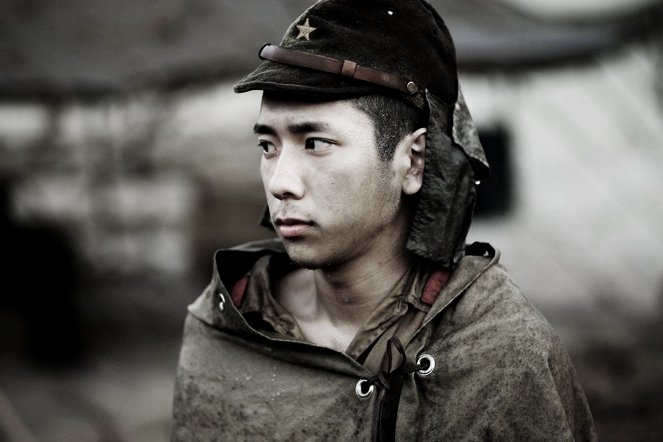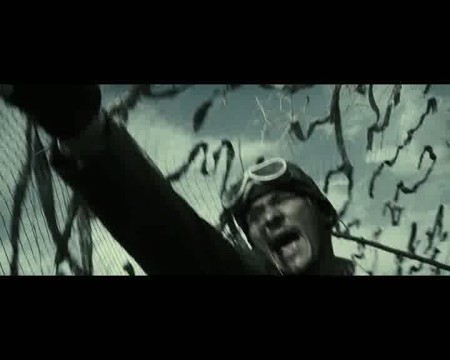Directed by:
Clint EastwoodScreenplay:
Iris YamashitaCinematography:
Tom SternCast:
Ken Watanabe, Kazunari Ninomiya, Tsuyoshi Ihara, Ryō Kase, Shidō Nakamura, Takumi Bando, Yuki Matsuzaki, Takashi Yamaguchi, Nae Tazawa, Lucas Elliot Eberl (more)VOD (3)
Plots(1)
Letters from Iwo Jima is based on the book 'Picture Letters from Commander in Chief' by Tadamichi Kuribayashi. The island of Iwo Jima stands between the American military force and the home islands of Japan. Therefore the Imperial Japanese Army is desperate to prevent it from falling into American hands and providing a launching point for an invasion of Japan. General Tadamichi Kuribayashi (Ken Watanabe) is given command of the forces on the island and sets out to prepare for the imminent attack. General Kuribayashi, however, does not favour the rigid traditional approach recommended by his subordinates, and resentment and resistance fester among his staff. (Warner Bros. Home Entertainment)
(more)Videos (2)
Reviews (9)
I've read the book that Clint and the writers were inspired by, and I have to say that I imagined everything the way it was eventually presented to me in the film. Letters from Iwo Jima is undoubtedly one of the best "modern" war films I have seen.__P.S. Be sure to get the soundtrack - but be warned, it's terribly addictive and you won't be able to get it out of your head!
()
I enjoyed this film very much. For me, it’s a completely different take on the exhausted topic of the Second World War, this time from the "opposite" side of the barricade, that does not carry the stars on the flag or bulletproof democracy. The Japanese are portrayed as a proud people who would rather fall to their last man than surrender their territory and, more importantly, their lives to an arch-enemy, which is very much reflected in the film overall. Eastwood conceived the battle of Iwo Jima in part as a probe into the souls of these determined soldiers, as evidenced by the battle sequences that keep a powerfully palpable dramatic face throughout. We gradually get very close to the protagonists, as if we were standing right next to them and crouching with them, hidden from enemy fire. I really felt sorry for those quite nice people who had to retreat step by step in the face of the ruthless American advance, and preferred to voluntarily put their lives on the lines in order to preserve their honour. Clint did a great job, with feeling and with all the life experience he has gathered throughout his life, and I have no choice but to bow in recognition. BRAVO, MAESTRO!
()
My next encounter with war Eastwood, where the director once again shows that he is much closer to a human story than capturing war. He is not trying to make a great war film, but a great drama. I simply cannot forget some scenes from the movie. The scene with the dog, touching and harsh at the same time, Japanese fanaticism, which ends in mass suicide with a lot of grenades, a bucket of excrement, which means the difference between life and death. Even in war, there is room for happiness. An excellent film that surpassed its doppelgänger "Flags of Our Fathers". I admire Eastwood for not shooting in English, but in the right language, just like Mel Gibson did in "Apocalypto" or "The Passion of the Christ". That's how it should be. And not like the case of the film "The Girl with the Dragon Tattoo", which is great in the American version, but why the hell is it set in Sweden when the characters speak English anyway? More: http://www.filmovy-denik.cz/2012/04/diar-milovnika-filmu-c-0003-eastwood.html
()
A much more sincere and stronger war film than the tearful and extremely pathetic Flags of Our Fathers. Clint Eastwood really stepped up his game in the second film, which, in contrast, shows the conflict from the other side and tells an excellent story full of Japanese traditions, customs, and tactics. How accurately it reflects reality can only be judged by eyewitnesses and war experts, but I dare say that the film was presented to the audience in a very bearable way. Thank God it doesn't just show the Japanese as suicidal lunatics and heartless killing machines, but also portrays them nicely from the other side right from the beginning. From young boys separated from their families to high-ranking officers with connections to the West, who are willing to proudly sacrifice their lives for their country. Watanabe is excellent, the action is decent and the non-combat scenes are very impressive. This solid film is worth watching if inly for the fact that we may have the opportunity to see a comprehensive view of an event in the war from this different and culturally distinct perspective, despite some minor flaws and a slightly excessive runtime (or rather, some unnecessary scenes).
()
Iwo Jima Island - deserted, no water, full of bothersome insects and afflicted with unbearable humidity. But still, it is a strategic key to the Pacific... If I hadn’t known anything at all about the Letters I wouldn’t have hesitated an instant in swearing that this was filmed by Kurosawa. Everything from picture composition, introduction and departure from plot action through supporting characters through to the overall atmosphere - this all bears his signature. Clint Eastwood has made an excellent picture about the senselessness of war and respect for the enemy. Despite the fact that the battle scenes aren’t at all central to the movie, we get several here and they are unarguably outstanding. Don’t expect a second Saving Private Ryan, though. This is a considerably more intimate experience. Ken Watanabe plays is Mifune-scale role exemplarily. If the first half of Letters from Iwo Jima had been shorter, there would have been nothing to fault.
()
Gallery (51)
Photo © Warner Bros. UK



Ads